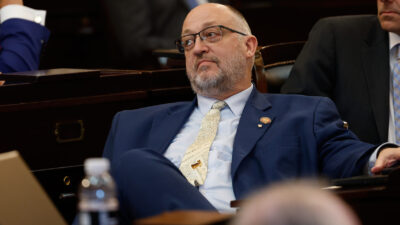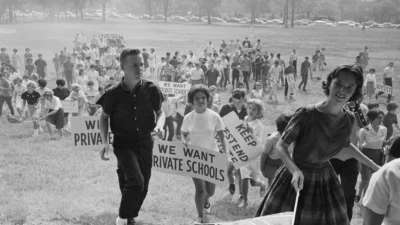A four-year-old recorded sermon given by Ohio state Rep. Gary Click, R-Vickery, may shine a light on the religious motivations behind Ohio’s proposed health care ban for trans youth.
The sermon, which was posted on the YouTube channel of Fremont Baptist Church, where Click is a pastor, shows Click defending conversion therapy and suggesting that homosexuality and the idea that one can be trans are pushed by Satan in order to undermine the family.
Throughout the sermon, Click emphasizes his view that God provided a specific plan for the family. Click suggests that homosexuality, trans people, and single-parent homes all break from this plan. He claims that Satan works to stray individuals away from the plan, which he says leads to the “crumbling” of society.
Click is the sponsor of HB 68, also known as the Save Adolescents from Experimentation Act or SAFE Act. The SAFE Act would prohibit physicians from providing gender-affirming care, including puberty blockers and hormone therapy, to trans youth. Gender-affirming care is supported by every major medical organization in the United States.
Click denies that his bill has religious motivations, but his sermon suggests otherwise.
“You’re not born that way,” Click says about trans people during the sermon. “God’s not going to curse you in the wrong body. He’s not going to curse you with desires that cannot be adequately and appropriately and biologically fulfilled correctly.”
At one point, Click appears to admit to having helped with attempted conversion. After condemning a California bill that sought to ban the practice as “an assault on the First Amendment,” Click describes conversion therapy as counseling “someone who struggles with those same-sex attractions, or struggles with their gender identity,” by showing them “what the bible says” and how to be “at one with the body God gave them.” Following this, he says, “I’ve helped people overcome that before.”
During his recent sponsor testimony for HB 68, Click said that he has never practiced conversion therapy and does not know anyone who has, following a question on the topic by state Rep. Rachel Baker, D-Cincinnati.
Conversion therapy has been condemned by several medical associations and human rights groups, including the American Academy of Pediatrics, the American Medical Association, the National Association of Social Workers, the United Nations, and more.
When asked by OCJ for comment, Click said that it is “inaccurate” to say that he has promoted or practiced conversion therapy. He said that “conversion therapy requires force or at minimum an act of trying to change someone into something that they do not wish to be… When an individual is struggling with unwanted feelings and they approach me or someone else, it is entirely ethical to listen to them, pray with them, and provide encouragement and strength, and reinforcement as they determine for themselves how they wish to live.”
Towards the end of the sermon, Click shows a picture of himself with Tony Perkins. Perkins is the president of the Family Research Council (FRC), a right-wing Christian organization that is labeled as an anti-LGBTQ hate group by the Southern Poverty Law Center.
Click finishes by discussing a trip he took to the U.S. Holocaust Memorial Museum in Washington D.C. While displaying a picture of himself standing next to a wall featuring the famous poem “First they came”, which is about the human rights atrocities of Nazi Germany, he further discusses what he deems as an attempt to “undermine our values.”
“When the family crumbles, society crumbles,” Click says. “If the church is silent, then the church will be held responsible. We can’t afford to be silent.”
In addition to the sermon, Click’s affiliation with the missionary group Baptist International Outreach (BIO) raises similar questions. A doctrinal statement posted on BIO’s website states that “homosexuality is an abomination to God and a scourge to any society.” It also calls homosexuality a “sin” that occurs due to people “giving into the perverseness that is in his or her heart.” The statement further claims that the Bible “condemns cross-dressing and effeminacy.”
Click’s biography on Fremont Baptist Temple’s website states that he “currently serves in an advisory capacity for Baptist International Outreach.” In his response to OCJ’s request for comment, Click clarified that he is “no longer serving [in an advisory capacity] with BIO.” He said that BIO is “a good organization” and that he is “not familiar with what their doctrinal statement currently says.”
In his response, Click also said that his role as a pastor and his role as a representative do not conflict. In bold letters, he wrote “the fact that science and the Scripture harmonize is not a conspiracy, it is a reality.” Click did not specify what science he was referring to.
While Click claims that his role as a pastor and as a representative do not conflict, he spends the final section of his sermon discussing the role of Christian conservatives in politics and encourages his audience to become politically involved. He discusses his role as a lobbyist for an international Christian school association and says the goal of his lobbying was to “reclaim our values.”
While encouraging his audience to get involved politically, Click lists several right-wing Christian political organizations and discusses being personal friends with the organization’s leaders. One of these organizations is Citizens for Community Values, now called Center for Christian Virtue (CCV). CCV approached Click in the spring of 2021 to put forth the SAFE Act.
Riley Roliff is a freelance journalist and a student at Cleveland State University. Her reporting focuses on LGBTQ+ issues and the role of money in politics.
The Ohio Capital Journal is an independent, nonprofit news organization dedicated to connecting Ohioans to their state government and its impact on their lives. The Capital Journal combines Ohio state government coverage with incisive investigative journalism, reporting on the consequences of policy, political insight and principled commentary.







